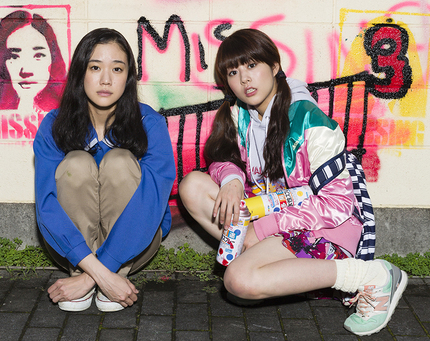Fantasia 2017 Review: JAPANESE GIRLS NEVER DIE Speaks Locally on Subjugation, Reaches Globally

28 year old Azumi Haruko simply vanishes one night. Two aspiring graffiti artists use her image from her missing poster to build a name for themselves and they become a viral hit. And a gang of high school girls are terrorizing the town, beating up only lone men walking home at night. These three stories intertwine in Matsui Daigo’s drama Japanese Girls Never Die, based on the novel Azumi Haruko wa Yukuefumei by Yamauchi Mariko.
Haruko and her fellow employee Hiroko make a pittance in salary compared to their male counterparts, Jiro and their boss Shacho. Haruko is asked to dress nice, serve tea and sit meekly during an upcoming meeting. In fact, she should dress nice a little more often. When the time comes to hire a new employee they would rather hire a young pretty woman than a young man who has the skill set they are looking for.
Haruko will get together with an old friend from school, Soga Yuji, and a romance will not so much bloom, it is so subdued, but will still happen between the two. Haruko finds out through a friend that Soga dumped her and starts having an affair with a married woman.
Graffiti artist Yukio starts going out with bubbly Aina but she soons become too ‘clingy’. He offers to share her with his partner Manabu. Later he yearns to upgrade to a younger girl. A young girl he is also sure he can share with Manabu later. Yukio will dump Aina and she will yearn to find love and acceptance wherever she can, with whomever she can.
For these two young women their stories have an underlying sadness, for they only want to be loved the way they deserve to be loved. Yet they are merely discarded after their ‘usefulness’ has run out, tossed aside by young men who questionably know what love is really about. Both Aoi Yu as Haruko and Takahata Mitsuki as Aina deliver the emotional performances needed to punctuate how wrong this is.
The gang of girls rumble around on the fringes of these two intersecting storylines, though our two main groups will interact with them throughout the story. Even still, they are also victims of this subjection, if indirectly. Kawamoto, an old school mate of Haruko’s is reading a report on the gang and all he can comment on is that they flash their panties during an attack. Which means, one of their victims, while being attacked, still looked for his assailants’ underwear while he was being assaulted.
Keeping track of these three storylines can be a challenge as Matsui has obliterated the linear structure and swings back and forth between Haruko and the young love triangle. That the gang operates within both timelines, terrorizing throughout, not only speaks to how long they have been operating but gives a sense as to how long the struggle of subjugation goes on - that this is a battle that will not be won quickly. Japanese Girls Never Die is challenging an age old institution that goes back as long as anyone can remember.
I believe what Matsui Daigo and his screenwriter Setoyama Misaki are saying here is that there are two options to dealing with this subjugation. First, leave. Leave the circumstances that are holding you down or back. Find something that does not hold you back but elevates you, spiritually and physically. Second, fight back. The gang is the physical manifestation of this second option. Not content on be subjected to men they roam the streets at night laying beat downs on any man walking alone. Matsui and Setoyama also condemn the local constabulary, portraying the police officer as a bit of an oaf, challenging all authorities and institutions for not cracking down on the graffiti artists or the girl gang.
Japanese Girls Never Die speaks locally, but it reaches globally. The irony is not lost that this message is coming across through a medium that has had much scrutiny these past couple years about equality between the two genders.
One of the final shots of the gang, at the end of film, portrays it as multi-generational. Young girls mix with middle aged and elderly Japanese woman as they run a barricade of local authorities, all men. The message is clear that all Japanese woman can counter this subjugation, not leaving it to a new generation. This fight is all of theirs to wage.

Do you feel this content is inappropriate or infringes upon your rights? Click here to report it, or see our DMCA policy.






